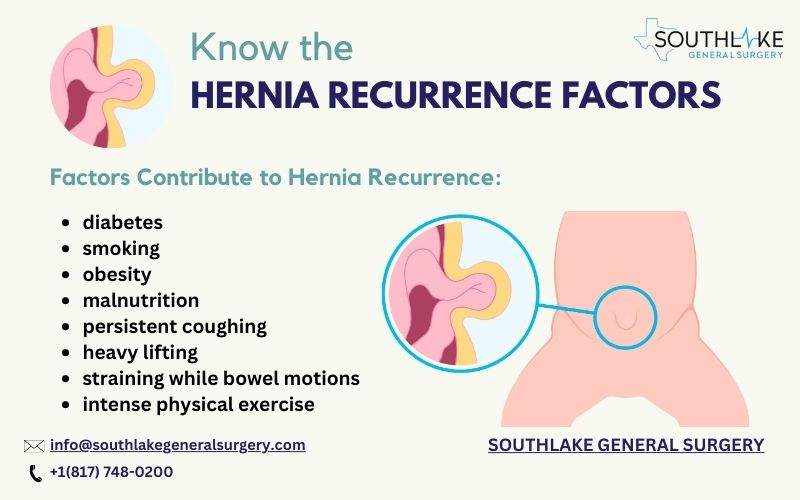A hernia recurrence is an unfortunate complication that is possible to have after having hernia repair surgery. The recurrence of a hernia can be caused by several reasons, some of which are the patient’s age, gender, and general state of health.
In addition, the chance of a hernia recurrence can be affected not only by the size and location of the first hernia but also by the type of surgical repair that was performed.
It is essential for patients to adhere to the postoperative recommendations provided by their surgeon, keep their weight at a healthy level, and refrain from engaging in activities that could put a strain on their abdominal muscles to lessen the likelihood of a hernia occurring again after surgery.
Hernia is a common medical ailment that happens when an organ or tissue protrudes through a weaker region in the muscle or connective tissue. This may result in pain and discomfort in the region that is being impacted. Even though surgical correction of a hernia is typically necessary, there is always the possibility that the condition will reoccur after the procedure.
Patients who experience a recurrence of their hernia may feel frustrated and may be required to undergo additional operations or treatments. In this article, we will investigate the elements that contribute to hernia recurrence, with the goal of assisting you in developing a deeper comprehension of the aforementioned issue.
Factors Contribute to Hernia Recurrence
According to Dr. Valeria Simone MD, an experienced general surgeon at Southlake General Surgery, Texas, USA, the following are some of the factors that may contribute to hernia recurrence.
1. Surgical Techniques for Hernia Repair
One of the most important aspects that play a role in determining whether a hernia will recur is the method of surgery that was used to do the original repair.
The level of expertise, experience, and ability possessed by the surgeon is a significant factor in determining the likelihood that cancer will return after treatment.
The recurrence of a hernia can be caused by several factors, including improper surgical execution, inadequate closure of the defect, or an inadequate attempt to strengthen the weakened area.
Therefore, it is necessary to select an experienced general surgeon that focuses on hernia repairs as their area of expertise.
2. Tissue Healing and Strength
Healing of the tissues following hernia surgery is essential to the patient’s long-term recovery and health. However, there are several factors that can hinder the repair of tissue, which in turn makes it more prone to recurrence.
The following are all conditions that have the potential to hinder the natural healing capabilities of the body and damage the area that has been treated.
- diabetes
- smoking
- obesity
- malnutrition
- persistent coughing
It is essential to have optimal general health before undergoing surgery to expedite the healing of tissues and limit the likelihood of a disease returning.
3. Mesh Selection and Placement in Hernia Repair
In hernia repairs, the use of surgical mesh is common because it offers supplemental support and minimizes the likelihood of a recurrence of the condition.
However, the selection of the appropriate type of mesh and the correct positioning of that mesh are two of the most important aspects in avoiding a hernia from occurring again.
There are a variety of meshes, each of which possesses its own unique features, such as strength, flexibility, and biocompatibility. The surgeon is responsible for selecting the suitable mesh for the hernia based on the state of the patient as well as the characteristics of the hernia.
In addition, the correct positioning of the mesh is essential to ensure the best possible support and strengthening of the weaker area.
4. Infection and Complications
Infections and complications that arise because of hernia surgery might significantly boost the likelihood of the condition returning.
An infection has the potential to impede the healing process and contribute to a breakdown in the repair of tissue. It is necessary to follow the post-operative care instructions religiously, including maintaining a clean and dry environment at the surgical site.
If you promptly report any signs of infection or problems to your healthcare professional, you can help reduce the likelihood that the condition will repeat.
5. Lifestyle and Hernia Recurrence
Hernias can recur for a variety of reasons, some of which are related to lifestyle choices. The following are all examples of activities that might put stress on the healed area and raise the likelihood of a recurrence.
- Heavy lifting
- Straining while bowel motions
- Intense physical exercise
It is imperative that you adhere to the instructions provided by your surgeon regarding activity limits and that you return gradually to your normal activities as directed.
Keeping a healthy weight, exercising on a regular basis, and learning the correct way to lift weights are all things that can help lower the risk of a hernia coming back after it has been repaired.
Outlook
Individuals who get an awareness of the elements that lead to the occurrence of hernia recurrence may be better able to take preventative measures to reduce the risk of the condition, even though experiencing hernia recurrence can be quite frustrating.
Finding a qualified surgeon, ensuring optimal tissue recovery, selecting the suitable mesh, preventing infections, and leading a healthy lifestyle are all critical components in the process of preventing a hernia from occurring again.
If you have any worries or have any symptoms after having hernia surgery, it is imperative that you see your healthcare professional to receive the appropriate examination and direction.
Appointment
For more information on Hernia Recurrence Factors and consultation with Dr. Valeria Simone MD at Southlake General Surgery, Texas, USA. You can contact our healthcare expert today for a quick appointment at +1(817) 748-0200.

